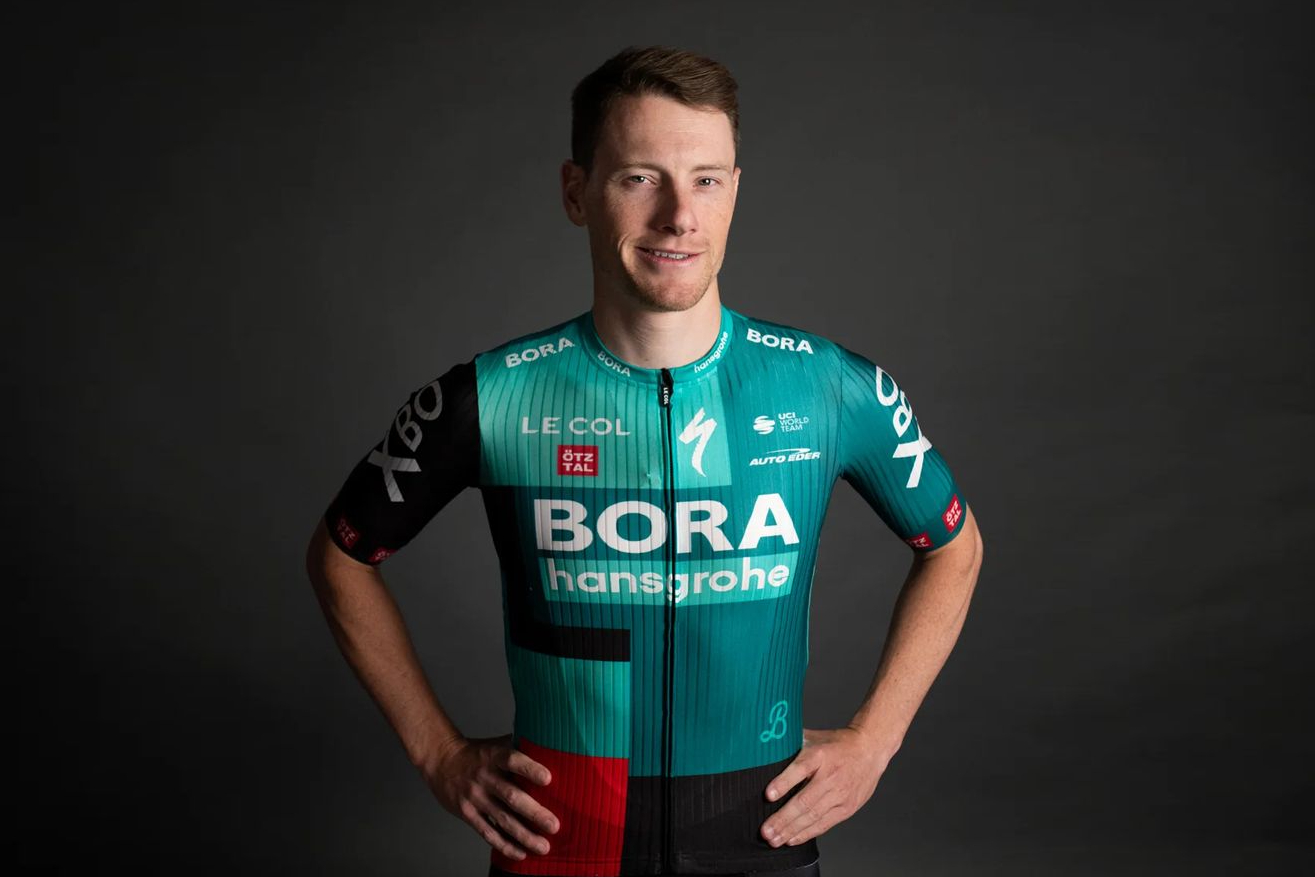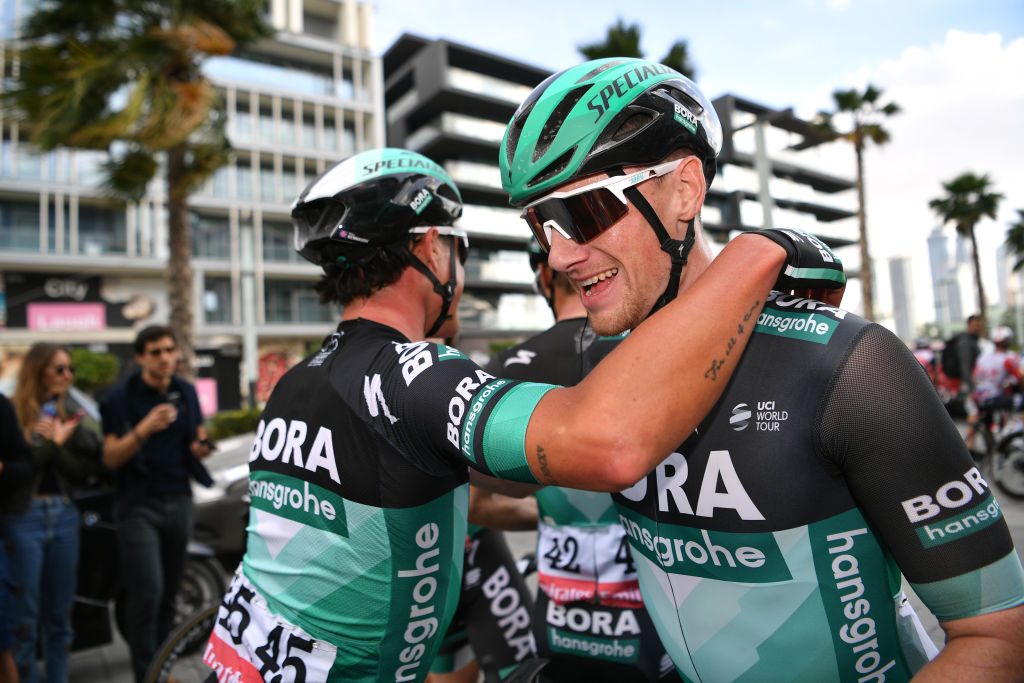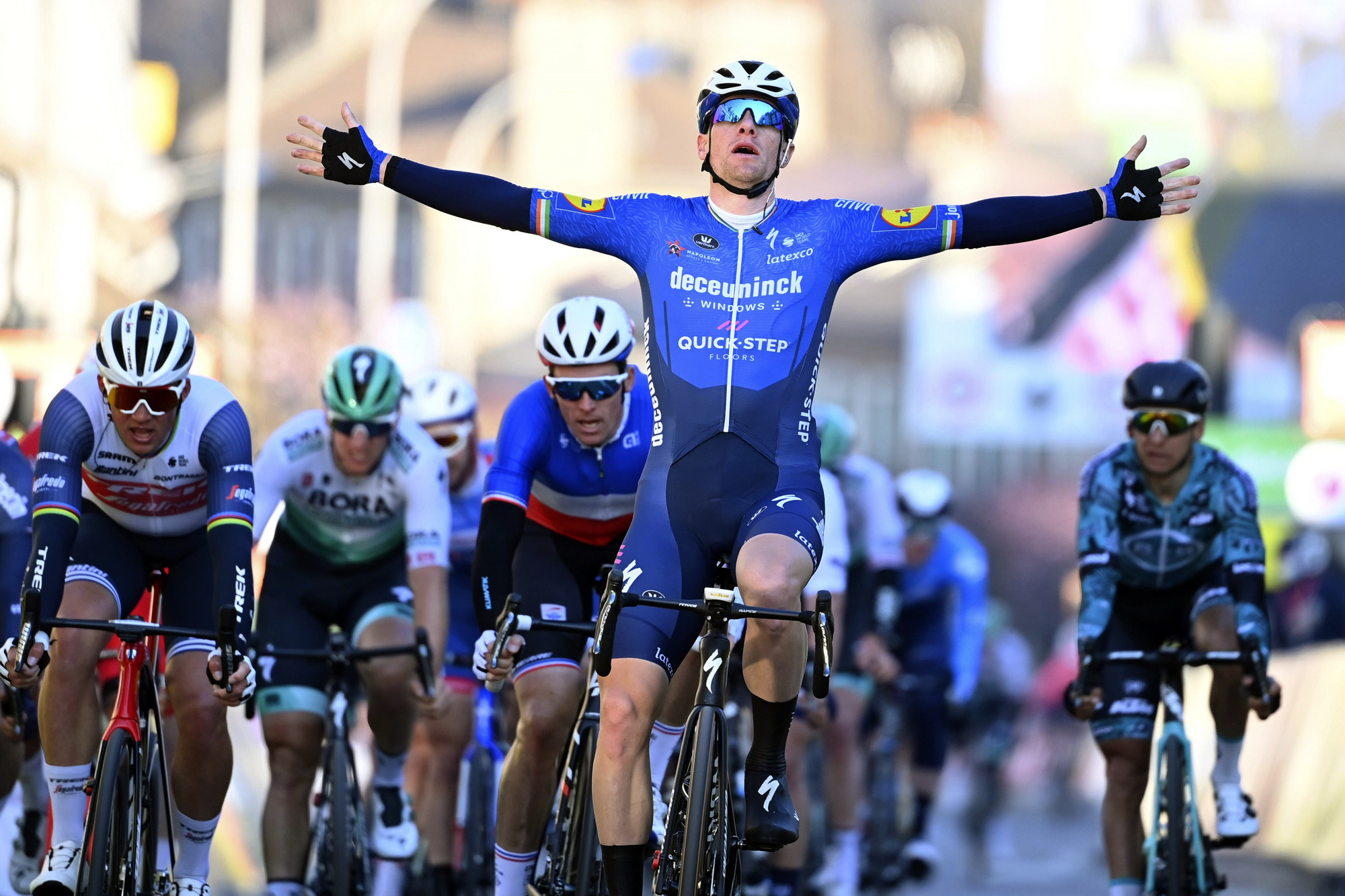Sam Bennett: I've been successful before and I will be again
Irish sprinter says he felt like he was coming home with Bora-Hansgrohe return

Amid all the talk and speculation about whether Fabio Jakobsen will be QuickStep-AlphaVinyl's sprinter at next year's Tour de France, if Mark Cavendish will get the nod and beat Eddy Merckx's record, or if Wout van Aert can win the green jersey, it's noticeable that returning Bora-Hansgrohe sprinter Sam Bennett is no longer the main topic of conversation.
The Irishman was the best sprinter in the 2020 Tour, winning two stages and taking green to Paris, and was arguably the world's best fastman in the early months of 2021. But out of sight, out of mind, as the old saying goes; his injury of last season means he's a drifted from the discussion somewhat, a little off the radar.
"It wasn't during the Tour, but around October, November, I was like 'I'm forgotten about here," Bennett tells Cyclingnews, speaking openly and frankly during a long conversation. "The cycling world moves on quickly. Once you're injured and you're out, life goes on and nobody cares."
So how does that feel? "It motivates you to come back," he responds. "To prove yourself again. To win bike races and to train hard."
Bennett is not your typical sprinter, or at least not your stereotypical sprinter. The likes of Mario Cipollini and Mark Cavendish have strong, outspoken characters who appear at ease in the limelight.
Larger than life, alpha male types known for big personalities and forthright opinions. Had they been in the position Bennett was last summer, ungraciously criticised by a vengeful team manager, they'd almost certainly have had their say.
But Bennett was always a bit quieter, happiest to do his talking on the bike. He's kept his head down in recent months and used whatever frustrations he was feeling to fuel his return. His response will come in the hustle and bustle of the bunch sprint, his point will be proven through results rather than words.
Get The Leadout Newsletter
The latest race content, interviews, features, reviews and expert buying guides, direct to your inbox!
You might have wondered beforehand how he will be after months on the sidelines; one 45-minute conversation later, you come away believing the best may yet be ahead.
"I've been successful before and I will be again," he says with quiet conviction. "That's what I keep telling myself. And to be honest, okay, it wasn't a mental break, there were some hard times, but I'll come back, and I will be strong again."
The words are delivered in a matter-of-fact way. It's not his style to brag or boast, to stand up and speak loudly and make bold predictions. But as good as he was in 2020, he believes he can improve.
'It felt like I was coming home'

Much has changed for Bennett. He and his wife Tara have been a tight unit since their teenage years, supporting each other and growing together, backing each other up. Now two have become three: their son Benjamin was born in December, and they are getting used to the dizzying swirl of first-time parenthood.
"It's an adjustment period," he says, laughing. "We athletes are self-absorbed people, then you realise it's not about you anymore. He's doing great and Tara is doing great, so it is fantastic."
Since the birth he's been training hard in Ireland but is now heading out on the road again. His current team camp with Bora-Hansgrohe in Mallorca will be followed by more training in Monaco, then blocks of time away in the heat of competition.
"It makes me want to use my time better when I'm away," he says, speaking about how becoming a father has affected his motivation. "And you want to create a good life for your family. You don't want to let them down either. You just want to make them proud.
"I don't think it will take the edge off in sprinting. Some sprinters say it makes them too safe, too cautious, but I haven't felt that yet. Hopefully it doesn't change that part of me."
Another change is in the wider circle he will surround himself with this year. After two seasons with Deceuninck-QuickStep, he's back with Bora-Hansgrohe. It's the squad where he turned professional, the team he competed with for six years. He may have gone elsewhere to get the opportunities he felt were lacking, but he's returning convinced it is where he is meant to be.
"I was successful here before. I was really successful," he says, explaining the move. "I found myself here, I really discovered myself with [coach] Dan Lorang. I really worked well with him. So, discussions kind of started, we began talking."
Bennett left the team at the end of 2019, frustrated that Peter Sagan and Pascal Ackermann appeared higher in the pecking order. The former was a three-time world champion and a multiple green jersey winner; the latter was a promising German rider on a proud German team. Both had big value for the sponsors, but Bennett was, arguably, the quickest of all.
He wanted to be prioritised for the Tour and, having signed for Deceuninck-QuickStep, that's what he was. He clocked up a number of wins in the run-up to the race and then, guided into position by the strongest lead-out team in cycling, he eclipsed Sagan to win two stages and to end up with green.
The success continued in the first part of last season, seven wins underlining he was the man to beat. But even so, something wasn't quite right. His contract was up for renewal at the end of 2021 and with Deceuninck-QuickStep manager Patrick Lefevere openly saying the team couldn't or wouldn't match the offers of others, what had seemed a dream partnership lost a little sheen.
In retrospect, more may have been going on behind the scenes. Bennett's decision to depart and his subsequent knee injury saw things turn bitter, and Lefevere did what he had previously done with several of his other riders and publicly, pettily, criticised the Irishman. Bennett, to his credit, did not reply.
Meanwhile, things were gathering pace with Bora-Hansgrohe. At some point last year, team manager Ralph Denk and Bennett built bridges, talking things through vis-à-vis what happened before and in relation to what might yet be. The rapprochement was welcome, and the familial feeling started to return.
"We had a phone call," Bennett reveals. "And yeah, it was to get… [he pauses, thinks for a moment]. Obviously, everything was fine once I left. Like, I never went to the media giving out [being critical – ed.] or anything, everything was perfect. I didn't really speak to him for a year and a half, or maybe more. So, it was actually nice to talk again. It was familiar territory.
"You know, it's motivating when you're really wanted in a team. You want to be in a team where you are wanted. If you're in a team and they don't really want you, then that's not a nice environment. So, I felt very welcomed here. It was nice. Especially when I [finally] came back, it felt like I was coming home.
"It was a good phone call, it really set me strongly in the direction of coming here."
There were other factors too. Despite the success at Deceuninck-QuickStep, Bennett saw a lot of plusses too in where he'd been before.
"The year I left, I think I participated in 20-something sprints," he explains. "In only three of them I was outside the top three. I won 13 races. I was consistent, and I was good at it. It was some of my best legs. That was one thing. I knew Dan [Lorang] can really have me in top shape. And the bikes are fantastic."
It is, he says, all about being given all the support and opportunities he needs. About being believed in and really wanted by a team, about feeling valued.
"Everything was right, and the moment was right," he states. "It was a no brainer. It really appealed to me. I knew I was settling back into a place where I can be successful. That's what I really needed, and I wanted. And once I have the opportunities and a clear run, I know that I will be able to really have a good go at these targets."
'A wasted opportunity, another year gone'

It takes talent and application to make it to the top of high-level sport, but it takes something else to stay there. Cycling's history is full of riders who shone brightly but shone briefly, who were very good but who faded away. Perhaps it's down to the pressure of expectation, or the demands of fame, or the distraction of money and a comfortable lifestyle. In truth there are many reasons why trajectories can change.
What counts, though, is hunger. Not wanting success but really needing it. Bennett says that is his biggest regret of last year was being sidelined and having to sit and wait and wonder when he could race again. Hitting his knee off his handlebars out training was, he says, something that happens five or six times a year; when it occurred just before the Belgium Tour in early June, he didn't realise what a disruption it would be.
"It was very tough initially when I realized I wasn't going to make the Tour de France," he says. "I took a few years away from the Tour de France to go to the Giro and the Vuelta in order to build myself up towards the Tour. Then I came back, did what I said I was going to do, got the green jersey. And I wanted to go back again to prove that it wasn't a fluke.
"So, before the Tour…that was a hard moment. Then, once I knew that wasn't going to happen, that I was going to miss the race, then you reset, you go again. But when it was taken longer than I thought, that was hard as well."
He had, he says, a sense of the clock ticking.
"For me as an athlete, it should have been one of my best years of my career, just in terms of age and experience. I had done the big results; I did a lot of what I wanted to do. Okay, in some of the targets like San Remo and World Championships I haven't got close yet, but I've done a lot of what I wanted. And so, it really should have been one of my best years.
"So that was one of the hardest things for me, because, you know, I'm 31 now. As a sprinter, you hope that the speed stays there for a good few years more. Sitting at home with an injury was eating me up. Like, a wasted opportunity, another year gone. The only thing that saved my season was that not many riders get seven wins in the year."
The fact that he had been so successful in 2020 and the first part of 2021 doubtless made Lefevere's criticism of him hard to bear. It wasn't as if he had been twiddling his thumbs during his time with the team; instead, he had clocked up 14 victories and given them a green jersey too.
But just as he did for many months, he's not going to talk about the subject. Asked how he felt about the negative comments, he declines to answer. "I'll have to skip that one, I'm afraid, if that's okay. I'm sorry [laughs]. I absolutely know you have to ask that, but I'm sorry, I'm not able to…"
He will, as we said earlier, let his pedals do the talking.
The new season is fast approaching, and Bennett is working hard. His knee problem is completely resolved and while his return to competition last autumn was modest in terms of form, the issue then was fitness rather than injury.
He knows it will take time to get back to where he was but that's okay; he has, as he points out, had periods of injury before and he knows what to do. Be patient, do the work, trust the process. The body will respond, and, with that, the condition will come. He's sure of that.
As things stand right now, the Saudi Tour and the UAE Tour are on his schedule. So too Paris-Nice and Milan-San Remo. But he states that this all depends on how he is riding; if he and the team decide he needs more time, tweaks will be made. He'd rather delay the start of the season rather than go to a race and just ride around.
"The performance side of the team, the management, they know that I'm not going to be hot out of the blocks," he says. "They know that it's going to take just a little while longer than normal. I won't start the season like I did last year or the year before, but I'll get into it and I'll come back pretty strong. Dan [Lorang] knows me really well. He knows when I'll be right. So, a little bit of a slower start."
Still, he sees benefits to that. "I've never targeted the Worlds and I know that this year's race is for a sprinter. And obviously the Tour de France is a big one too. And as a sprinter you need to be able to go all year. I need to be good at the start to prove myself that I'm back, that I'm capable of going to the Tour. But also, to be right then and to be strong later in the year, too."
The truth is that if he shines in the Tour or the Worlds, nobody will remember if he won in Saudi or UAE.
Form aside, one determinant of success will be how well his lead-out works. Deceuninck-QuickStep is known for having perhaps the best sprinter's train in the business, with the likes of Michael Mørkøv putting Bennett, Cavendish and others in exactly the right place at exactly the right time.
How sure is he that Bora-Hansgrohe will be able to offer him the same level of support?
"Well, we have Ryan Mullen, Danny van Poppel and Shane Archbold now," he says. "Even before that we have guys that can do some great work to make the race the way we want. With these three guys in front, I have full confidence in them.
"They get on really well together. You need that as well. You need to have that kind of bond off the bike. And they're so motivated in training. They're in shape. They are ready. They are strong guys and I'm really excited to work with them. I do really think we're going to have a lot of success together."
All going to plan, Bennett will have a lead-out to match the one he enjoyed in the last two years. If he does, he believes he will be in a very strong position for races such as the Tour.
But what is more important to him: winning stages or taking green?
He pauses for a moment, thinking things through. "So that is a hard one," he says. Then pauses again. "Well, it isn't a hard one. I want the green jersey, obviously. I really want to fucking fight for it. But I would hate to not get stage wins in the fight for the green, and then end up in the last week with that out of reach and without a stage win yet. So there has to be a healthy balance between going for stages and going for green.
"The way I always looked at was—and it actually worked out when I won the green—was collect the points initially but just not fully fight for them. Go for the stages, and then once you see that the green is in reach at a certain point, then you go for green. But I'm going to be putting myself into condition and in a position where I should be able to do both.
"It's bloody tough. But I think I will have the support there. I want to show that it wasn't a fluke."
What's encouraging for him, and potentially worrying for his rivals, is his belief that he wasn't at 100 percent of his form in the 2020 Tour.
"I was stronger, I think, at the Vuelta the year before," he says. "Okay, at the start of this year I was pretty similar but, last year at the Tour, I don't think that was me at my best.
"The thing is my best legs were when I was working with Dan Lorang. I will be stronger at the next Tour de France than the last time I was there."